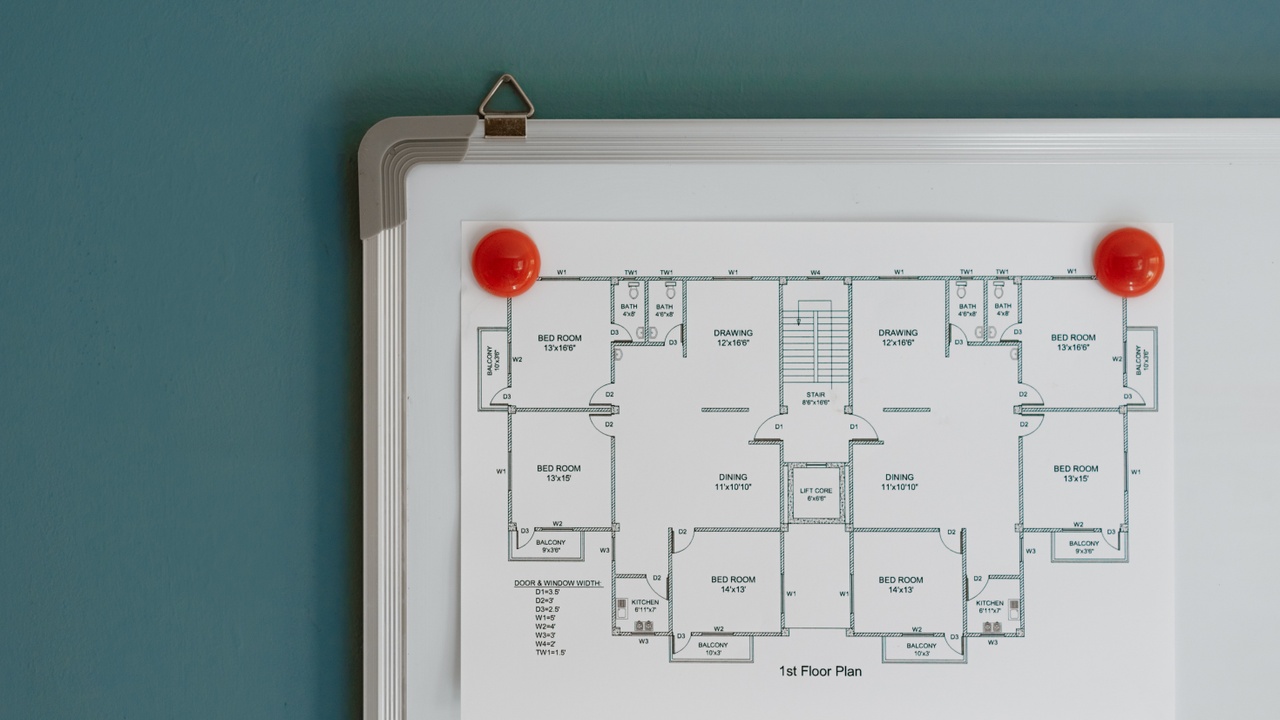Leanne Pogson, Interview with a Planning Consultant
Nov 14, 2022
Hi Leanne, thank you so much for offering to talk to us today at Her Own Space and it is great to connect with a planning consultant who can help answer some key questions for our members.

1. So tell us a bit about you, how did you start your career and what type of projects do you work on?
Hi Ellora. Thank you for asking me to contribute, it is a great concept.
I started in planning in 2003, the year after I graduated with a degree in (physical) Geography. I fell into planning after trying teacher training for a few months (it wasn’t for me) then moving back home and doing some temp work, desperate for a job which was semi related to my degree. A job came up in the planning department in my hometown as a planning technician. A few months later I accepted the role of trainee planning officer. I worked at North Lincolnshire Council for almost 16 years, minus a 5 month stint at Gloucester City Council. I left Local Authority in 2019 for the private sector, where I stayed for 3 years. This summer I took the plunge into self employment and set up Vesta Planning Ltd, a private planning consultancy whilst also working full time as a Development Manager for another Local Authority on a contract basis. I am really enjoying contracting and I’m looking forward to growing Vesta in the background.
Over the years I have worked on pretty much all planning projects, from household extensions, adverts and changes of use, to major housing and commercial projects, renewable energy and minerals applications. In the private sector, a lot of my work was rural based, including farm workers dwellings, solar energy and planning for new housing developments.
2. What are the main challenges about being a planning consultant today?
I think one of the main challenges is keeping up to date with changes in legislation. There is often ‘talk’ of changing the planning legislation, often which never comes about, but in the past few years there have been changes to the Use Classes Order and Permitted Development Rights. Some changes we know are coming, but others can come into force with little to no notice, so it is important to keep up to date with what is going on.
Another challenge working across different local authority districts is that their planning policies are often very different. Add to that the NPPF, neighbourhood plans and the often changing statuses of self-build and five year housing land supply positions, there is a lot of research needed before starting a new job.
3. Are there any tips or pre-planning advice you would give women about to undertake their home renovations.
Don’t be afraid of applying for planning permission. I see so many people try to get projects under permitted development to avoid having to apply for planning, but it is honestly not a scary process. Some people don’t want to spend money on the planning fee, but just over £200 is a tiny fraction of the cost of building an extension, so in my opinion, it is not worth making extensions smaller or more impractical just to avoid planning. The plans are needed for the builder, so it really isn’t a bad thing to apply for planning. The planners have to consider the ‘fall-back’ position of what could be built under PD too, so that is always worth bearing in mind.
Before starting renovations, definitely make sure the building isn’t listed and check if it is in a conservation area or other designation. Most people are aware when buying a property, but it is surprising how many people I have spoken to over the years who didn’t know they had bought a listed building! Having constraints on the property will likely affect what you can do, or how you can do it, so definitely check! Also check for any protected trees - and don’t just cut them down without consent, you could find yourself in court with a hefty fine.
4. What do you think are the main reasons projects go wrong and equally go well?
Willingness to compromise! Most clients are happy to follow professional recommendations, but some are not. The ones that are not are more likely to end up with either a refusal, something which is not buildable or otherwise needs changing later down the line. Don’t get me wrong, not all projects need compromise, but more often than not the expectations at the start and what the final outcome is, are often different.
Budget is always a big issue too, especially with the vast increase in the cost of materials. Most projects go over budget and I think it is important to have a realistic understanding of costs before starting the planning/detailed design process. There are often other things to take into account if you are going through planning too, especially for new builds. Ecology is a big thing at the moment, and there is the potential for drainage surveys, contaminated land, heritage, topographical surveys as well as s106 contributions and CIL. Most of these won’t be required for extensions and alterations, but they are something to keep in mind if you are looking at developing for housing.
5. What recent changes out there do you think homeowners may not be aware of and what is the best way to be on top of change?
The latest change is for permitted development for upwards extensions under the prior approval procedure. This has come following the larger home extensions for single storey rear extensions. It will not be relevant for a lot of homes, but it is worth considering if you have a detached property and are wanting to increase the height. Of course it is not always guaranteed, but it makes the process quicker and easier.
The planning portal is a good way of keeping on top of what you can and can’t do under permitted development as well as the government website. There are various planning blogs on-line which cover legislation updates too.
The assessment of planning applications rarely changes, unless the local plan or NPPF is dramatically updated, so it is best to check your Local Authorities website for guidance specific to your area. Speaking to a local planning consultant or a planning officer is a good way to check local guidelines on specific project ideas.
6. What do you think is the most misunderstood aspect of planning?
Permitted Development! I see/hear so many people think they know what is permitted development because their builder told them so, or their cousin didn’t need planning, or they saw it on facebook etc. PD is not straightforward and a 3m rear extension isn’t always permitted development. There is so much more to it than most people realise and there is a lot of bad advice out there especially from people who *think* they know.
Firstly I would always check if PD rights are intact, most properties have full PD rights, but if the property is listed, in a conservation area or a conversion for example, PD rights may be different. They may have also been removed in full or in part so it is always worthwhile checking. The planning portal website has an interactive house with guidance on permitted development and there is technical guidance on the government website which answers common questions.
The only way to get a formal, legally binding answer to whether something is permitted development is to obtain a Certificate of Lawful Development. Many Council’s offer permitted development advice for a small fee, but whilst this may be adequate for most circumstances, it is not legally binding.
7. What are the biggest changes you are seeing in residential home renovations projects and what do you predict?
The economy and cost of materials is making a lot of people consider how they renovate and if/how they extend their property. I see people considering using different materials and changing their plans based on costs.
The Covid-19 pandemic has seen a shift in more people wanting dedicated spaces for home working, whether by reconfiguring layouts, extending or building home offices in their gardens.
Planning is pretty static and I don’t think there will be any big changes for home renovation projects. Hopefully the cost of materials will come down soon and people can be confident in their project delivery.
8. What projects do you enjoy working on the most?
Ah this is a really difficult one because I enjoy a varied workload! There isn’t one type of project I can honestly say I love more than others. It is often the projects where you bond with the client that I most enjoy, I really want to see them get their planning application through successfully and I look forward to seeing the final result. I do also enjoy finding loopholes in planning and projects which are a bit of a challenge.
9. What would be the main piece of advice you would give to women thinking about working within a planning consultancy role?
Get experience in both public and private sectors! When I first left the Local Authority for the private sector, my new employer did have some concern that I didn’t have any private sector experience. However, I think that bringing 16 years of public sector knowledge and contacts was more valuable than the private sector experience, and the concerns they had were unfounded. I have learned a lot from working in private practice and I am grateful for having three years working for a really good company. The experience of both has given me greater knowledge and understanding and it is easier to talk to clients about realistic expectations after seeing it from both sides.
10. What do you envision for home renovations in the future?
I think more people will have a go at doing jobs themselves rather than employing professionals. With on-line tutorials and some basic DIY skills, there is a lot people can do themselves if they want to save money on labour.
I think if the cost of living and the cost of building continues to rise, people will start to look at maximising the space they have and building in storage, dividing rooms etc rather than creating more floorspace.
I also envisage the use of more renewable energy, whether that is hydrogen boilers, air source heat pumps, solar panels or better insulation, there will be a real push towards carbon reduction, and renovating is an ideal time to explore these opportunities.
Please feel free to contact Leanne if you would like to discuss any upcoming projects you have.
07551 59722

